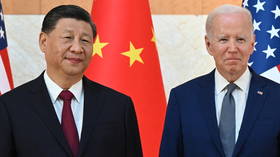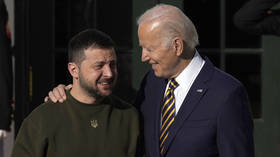Fyodor Lukyanov: US-China trade is surging as military tensions escalate, what exactly is going on?

These are interesting times. At a time when everyone is discussing another political escalation between Washington and Beijing (see the balloon over American territory and the cancellation of Secretary of State Antony Blinken's visit), the US Bureau of Statistics has reported a record trade turnover between the two countries. In 2022, it exceeded $690 billion.
It is time to get used to paradoxes. To describe contemporary processes, derivatives of the term "hybrid" (something derived from the crossing of different breeds, varieties, species) are often used. So why shouldn't normal economic logic be combined with contradictory motives of geopolitical rivalry?
However, the question is: How long can this coexistence last?
US-China relations are one of the most interesting phenomena of the last half century. Last year marked the fiftieth anniversary of the Richard Nixon-Henry Kissinger U-turn, when the United States recognized Communist China, which had previously been a symbol of red radicalism. There had been no reform at all in Beijing, unless you count the Cultural Revolution, which was still raging. In a Washington bereft of today's obsession with “values,” they thought: If Maoist China is in opposition to Brezhnev's USSR, why not join forces?
It would be an exaggeration to say that Sino-American normalization decided the outcome of the Cold War in favour of the US, but it certainly made the Soviet Union's position much more difficult.
However the convergence of geopolitical interests at that time was not matched by economic interaction - Washington and Beijing were in different universes. It was only after Mao's death that the Chinese miracle happened - the world's then second-most important socialist country embarked on a market transformation.
The US-China political understanding proved beneficial - America became the Asian country’s caring and gentle guide through the capitalist jungle. The economic cooperation that began at the turn of the 1980s turned into a financial and industrial symbiosis in the early 21st century. More importantly, it became the backbone of the global economy as it emerged at the end of the century.
Since then, as Beijing’s rise continued, the question of potential conflict with the US, while ever-present, was not pushed too hard. On the one hand, Americans did not believe that impressive growth rates would make China an equal in the foreseeable future. On the other hand, for a long time (almost until the 2010s), American intellectual discussion was dominated by the view that as capitalist transformation progressed and the middle class grew, the Chinese political system would turn towards and align with its Western “inspiration.”
In other words, they expected something like Japan - with its own peculiarities, but generally understandable and loyal to US political structures. The fact that American troops were stationed in Japan and South Korea when each of those countries ‘transformed’, and that the whole process took place under external control, was considered important but not decisive.
In China, they believed, it will work the same way, but just take longer.
The past decade has seen a line drawn in the sand. Xi Jinping's rise to the top of the party and the state has shown conclusively that China is heading in the wrong direction from Washington’s point of view. And Donald Trump has legitimized the blatantly anti-Chinese course that Barack Obama had already implicitly pursued. Now, for the first time in forty years, political incompatibility has come into conflict with economic interdependence.
All current strategic planning in the United States is based on an imminent confrontation with China in the coming years, or perhaps decades. There is a bipartisan consensus on this, and these scenarios are discussed openly and frankly. Taiwan, which, if Biden is to be believed, the US intends to defend at all costs from absorption by the mainland, is seen as a pretext for a direct clash.
It is noteworthy that the recognition of Maoist China actually began with a deal on Taiwan - Washington would not question the unity of the country under Beijing, and the latter would take no steps to implement unification in practice. Both sides committed themselves to the ambiguous restraint that has been in place for decades. However, now the framework is bursting at the seams, and it’s fair to say that it’s the Americans who were first the abandon the magic formula.
At the same time, the US is imposing restrictions on the Chinese economy - targeting its goods and companies. Some of these measures are commercial and protectionist, but the majority are political and strategic. The aim is to slow down and ideally block technological development. This is paired to efforts to militarize the entire region and increase the armed presence of the United States and its allies there.
Yet, against this backdrop, trade is growing and the benefits of cooperation remain strong. And there even seems to have been a softening, at the end of last year, which some cheerfully interpreted as a return to pragmatism. Blinken's visit to Beijing this week was supposed to cement this. But then came the balloon. A seemingly trivial event, but enough to derail the whole thing. What did the balloon mean - was it a signal or an accident? What difference does it make in a hybrid age?















